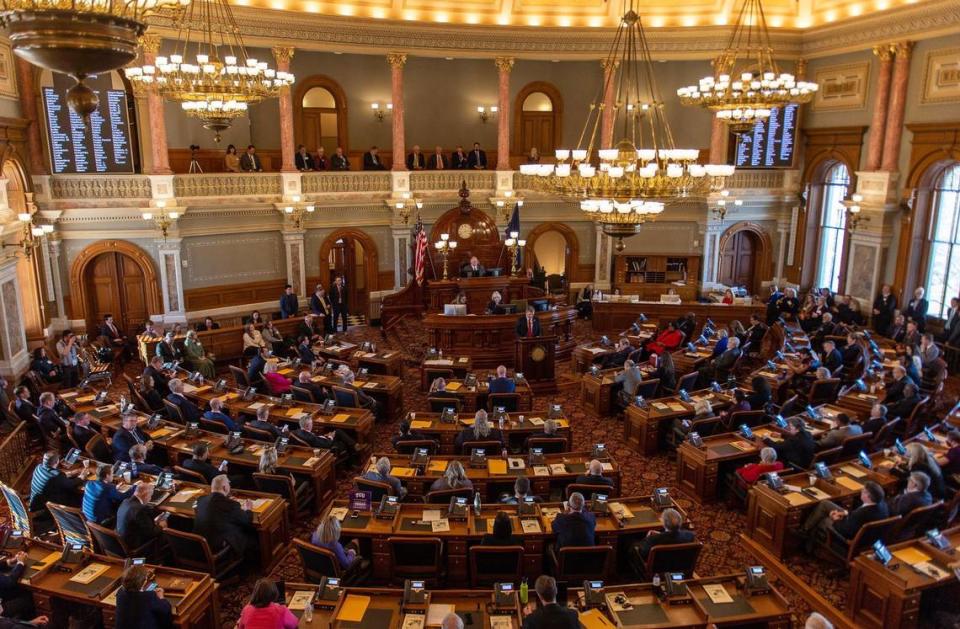Kansas House passes work requirements for able-bodied older adults on food assistance
- Oops!Something went wrong.Please try again later.
The Kansas House passed legislation Wednesday imposing work requirements on older adults who receive food assistance, the latest step in a yearslong effort by Republican lawmakers to limit government assistance.
The bill mandates that able-bodied adults ages 50-59 without children must work at least 30 hours a week or join an employment and training program as a condition of aid from the Supplemental Food Assistance Program, once called food stamps. Current law limits the work requirements to adults under 50.
The House passed the measure, HB 2140, on a 82-42 vote. It now heads to the Kansas Senate.
Over the past decade, the Legislature has expanded prohibitions on how public assistance can be used, strengthened work requirements and implemented stricter limits on how long residents can receive help. During the House debate on Tuesday, Rep. Francis Awerkamp, a St. Marys Republican, said the bill would ensure Kansans took advantage of useful work search programs.
“This bill is quite unique because all it does is says if you allow us to help you learn how to fish we will keep feeding you but you have to have a little bit of effort in the game,” he said.
Haley Kottler, campaign director and lobbyist for Kansas Appleseed, a group which advocates for low-income families, said it’s a myth that individuals will only work if forced to do so. Kansans who receive food assistance often hold low-wage jobs with inconsistent hours, she said.
“There is much to do to ensure Kansans can live healthy and fulfilled lives,” Kottler told legislators at a hearing. “Rather than expanding work requirements for more Kansans, why can’t we take advantage of strengthening our safety net programs to help individuals and their families weather hard and difficult times they may come across?”
Kansas Gov. Laura Kelly, a Democrat, hasn’t said whether she would veto the welfare bill, but she has previously called for the repeal of welfare restrictions enacted under former Republican Gov. Sam Brownback. GOP leaders have shown no interest in revisiting the law, however, and have instead sought more limits.
Last year, Kelly vetoed a bill that required able-bodied adults without children between 18 to 49 on food assistance to join an employment and training program if they weren’t already working at least 30 hours a week. She cited inflation’s impact on food in her decision, saying at the time that with the “ rising costs of these necessities, we should be helping people afford the basics.”
The Legislature overrode the veto and the requirements became law in July 2022. Since then, nearly 1,700 able-bodied adults without dependents have stopped receiving food assistance, according to data from the Kansas Department for Children and Families. In July, those individuals represented 7.29% of all individuals receiving food assistance; as of January, the percentage had fallen to 6.87%.
Kansas has been reducing the number of people receiving food assistance for years. The average monthly food assistance caseload has fallen every year since 2014 with the single exception of 2021 amid the pandemic.
The proposal has been championed by the Florida-based Opportunity Solutions Project, a conservative think tank that serves as a lobbying arm of the Foundation for Government Accountability, which has received funding from Wichita’s billionaire Koch family. It has argued in favor of the work requirements bill by pointing to Kansas’ critical worker shortage.
“Making participation mandatory for able-bodied adults to age 59 years old is a great opportunity to connect these individuals with resources that will help them get, and maintain a job,” Steve Greene, a lobbyist representing the organization, told lawmakers earlier this year about the work requirements bill.
Democrats mostly used the House floor debate over the bill as an opportunity to push for Medicaid expansion, a signature issue of Kelly. But a Democratic-led Medicaid expansion amendment was ruled out of order and left off of the bill.
Kansas is one of 10 states that hasn’t expanded the program, which would provide health coverage to an additional 100,000 or more Kansans who earn up to 138% of the federal poverty level—an annual income of about $41,400 for a family of four.
Linking the welfare bill to Medicaid expansion, Rep. Heather Meyer, an Overland Park Democrat, contended the primary reason adults between 50 and 59 were not working was because of untreated health issues.
“We need to provide an avenue for older adults to get back to work and what that means is we have to expand Medicaid,” Meyer said.



